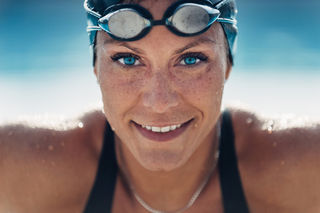1. Imagining success in your mind before you compete.
Posted Aug 04, 2016
“Focus, discipline, hard work, goal setting and, of course, the thrill of finally achieving your goals.These are all lessons in life.”
 1. Imagery training.
1. Imagery training.
Imagery has been defined as “using all the senses to recreate or create an experience in the mind.” Studies show that Olympic athletes have well-honed imagery skills that they call upon daily. It proves helpful in using training effectively, perfecting skills in training sessions, making technical improvements, imagining themselves prevailing in competition, and envisioning themselves attaining their ultimate goal.
Consider the reflection of a successful Olympic springboard diver:
Athletes who consistently performed at their highest level had effective strategies for quickly recovering when dealing with distractions or a subpar performance. By contrast, less consistent athletes needed to develop these skills further in order to become more consistent. Here's what an Olympic Alpine skier said:
A crucial issue for athletes is their ability to deal with unavoidable setbacks in their quest. The ability to reframe setbacks is key in helping these athletes forge ahead and persevere. On a related note, elite athletes are able to transform challenges into opportunities to reevaluate their progress and set goals that would facilitate their improvement. Here's how a rower came to terms with disappointment:
These words were spoken by Kristi Yamaguchi, an American gold medalist in figure skating. But what do they really mean in the context of Olympic sport? Research has found that elite athletes rely on an array of mental tools in their quest for gold. Here are three strategies Olympians use to get in the zone, described in their own words:

Source: Microgen/Shutterstock
Imagery has been defined as “using all the senses to recreate or create an experience in the mind.” Studies show that Olympic athletes have well-honed imagery skills that they call upon daily. It proves helpful in using training effectively, perfecting skills in training sessions, making technical improvements, imagining themselves prevailing in competition, and envisioning themselves attaining their ultimate goal.
Consider the reflection of a successful Olympic springboard diver:
“I did my dives in my head all the time. At night, before going to sleep, I always did my dives. Ten dives. I started with a front dive, the first one that I had to do at the Olympics, and I did everything as if I was actually there. I saw myself on the board with the same bathing suit. Everything was the same. I saw myself in the pool at the Olympics doing my dives. If the dive was wrong, I went back and started over again. It takes a good hour to do perfect imagery of all my dives, but for me it was better than a workout.”2. Distraction control.
Athletes who consistently performed at their highest level had effective strategies for quickly recovering when dealing with distractions or a subpar performance. By contrast, less consistent athletes needed to develop these skills further in order to become more consistent. Here's what an Olympic Alpine skier said:
“Once I push out at the start, I am focused on where I am at the time. A lot of it is 'line' in downhill. You don't go right at the gate; you've got the line that you have been running all week and you just say, 'Okay, I've got to stay high here, I have to go direct here, I have to jump this jump,' just so I am thinking of each obstacle as it comes. If I make a small mistake, often it doesn't even register for me until the end, when I'm at the bottom. At the time you are still thinking, 'forward, speed, momentum.' You don't carry the mistake down the hill. It is shelved until later while you try and compensate."3. Coping with setbacks.
A crucial issue for athletes is their ability to deal with unavoidable setbacks in their quest. The ability to reframe setbacks is key in helping these athletes forge ahead and persevere. On a related note, elite athletes are able to transform challenges into opportunities to reevaluate their progress and set goals that would facilitate their improvement. Here's how a rower came to terms with disappointment:
Advertisement
“To become a top performer in sport, you need to understand that when things are going well it's great but when things are going badly, that is when the problems are really going to arrive. Every successful Olympic gold medalist doesn’t have a plain sailing ride on the way and what makes you great is what you do when things go wrong. It took me a long time to learn that. I think if I had been aware of it a lot earlier I would have achieved things quicker."Though Olympians are a rarefied group, perhaps we all have something to learn from them when it comes to reaching our potential.
- Find Vinita Mehta's other Psychology Today posts here.
- Connect with her at drvinitamehta.com and on Twitter and Pinterest.
没有评论:
发表评论